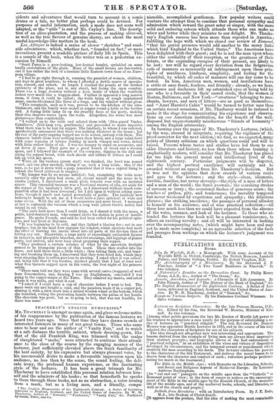THACKERAY'S ENGLISH HUMOURISTS. * Mx. THACKERAY is amongst us once again,
and gives welcome notice of his reappearance by the publication of the famous lectures we heard two years ago. Since that time they have drawn crowds of interested listeners in many of our great towns. Those who came once to hear and see the author of " Vanity Fair," and to watch at a safe distance the terrible satirist, whose dressing-gown, like that of the old Frankish King, was trimmed with the scalps of slaughtered " snobs," were attracted to continue their attend- ance to the close of the course by the engaging manner of the lecturer, just sufficiently elevated above the frank familiarity of the best society' by his expressive but always pleasant voice, by his unconcealed desire to make a favourable impression upon his audience, no less than by the sense, the sound feeling, the deli- cate irony, the profound human experience, or the fascinating style of the lectures. It has been a great triumph for Mr. Thackeray to have established this personal relation between him- self and the admirers of his books ; so that henceforth he speaks to them through these books, not as an abstraction, a voice issuing from a mask, but as a living man, and a fiiendly, compa- • The English Humourists of the Eighteenth Century. A Series of Lectures, delivered in England, Scotland, and the United States of America. By W. M. Tbackeray, Author of " Esmond," Pendennis," " Vanity Fair," 8te. Published bt Smith, Elder, and Co. nionable, accomplished gentleman. Few popular writers could venture the attempt thus to combine that personal sympathy and admiration which reward the great actor or singer, with the more solid and enduring esteem which attends those who can make us wiser and better while they minister to our delight. Mr. Thacke- ray's English success has been more than repeated in America ; fulfilling the hope with which we closed our review of .Esmond, "that his genial presence would add another to the many links which bind 'England to the United States." The Americans have been delighted with their guest; and he is not the man upon whom either the cordiality of their reception, or the greatness of their future, or the expanding energies of their present, are likely to be lost; nor.will he regard every deviation from the Belgravian code of manners as necessarily an infringement upon those prin- ciples of manliness, kindness, simplicity, and feeling for the beautiful, by which all codes of manners will one day come to be tested. In him, American men, women, and institutions have a critic at once frank, fearless, and friendly : already, as we hear, countesses and duchesses lift up astonished eyes at being told by one who is a favourite in their sacred circle, that the women of Boston, Baltimore, and New York—" creatures " belonging to mer- chants, lawyers, and men of letters—are as good as themselves; and "Aunt Harriet's Cabin" would be turned to better uses than on certain recent occasions, if Mr. Thackeray would be induced to make it the stage for communicating his experience and observa- tions on one American institution, for the benefit of the well- disposed but unquestionably mischievous "friends of humanity" among the English aristocracy. In turning over the pages of Mr. Thackeray's Lectures, (which, by the way, abound in misprints, requiring the vigilance of the proof-corrector for the next edition,) we find, as we expected, many points of literary criticism on which questions could and will be raised. Persons whose tastes and studies have led them to our older literature and history, no less than those whose training is emphatically modern, will consider that Mr. Thackeray has placed far too high the general moral and intellectual level of the eighteenth century. Particular judgments will be disputed, and the highest poetical excellence will certainly not be awarded without an appeal from Mr. Thackeray's decision. But it was not the opinions that drew crowds of various ranks and ages to the lectures : and the style—clear, idiomatic, forcible, familiar, but never slovenly—the style of a man of letters and a man of the world ; the frank avowals ; the searching strokes of sarcasm or irony ; the occasional flashes of generous scorn ; the touches of pathos, pity, and tenderness; the morality tempered but never weakened by experience and sympathy ; the felicitous phrases ; the striking anecdotes ; the passages of personal allusion to himself or his audience, and of wise practical reflection ;—all these lose much less than we could have expected from the absence of the voice, manner, and look of the lecturer. To those who at- tended the lectures the book will be a pleasant reminiscence, to others an exciting novelty ; and all will be interested in looking over the accompanying notes, (which might have been and may yet be made more complete,) as an agreeable selection of the facts and passages from writings on which the lecturer's judgment was founded.
























 Previous page
Previous page